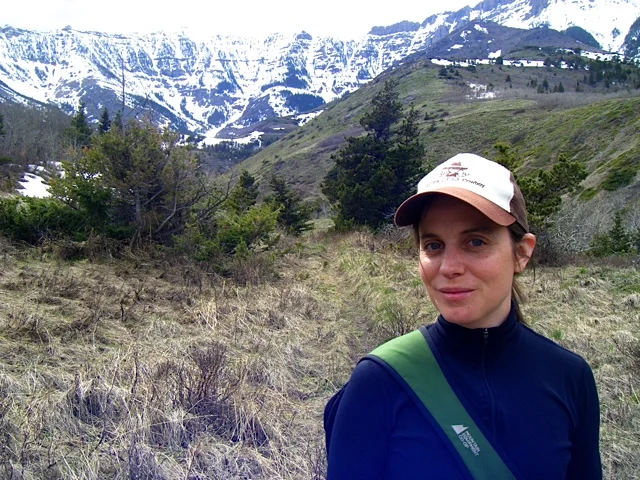Statistics grads have many potential career paths.
During the 2016-2017 academic year I will be teaching the following:
STAT2080 - Statistical Methods for Data Analysis and Inference
STAT5620- DATA ANALYSIS
Kim Whoriskey
“After completing my BSc Honours with Dr. Mills Flemming in the spring of 2014, I was lucky enough to start my MSc with her the following fall. I am interested in movement ecology and the environmental factors that drive it, specifically in marine systems. While technological advancements for tracking animals and measuring ocean characteristics mean that increasingly more information is available to study movement ecology, these sorts of information (e.g. animal tracks, sea surface temperature, and bathymetry) are often available on different temporal and spatial scales. My MSc work will be devoted to developing and testing statistical methodologies for relating animal movement to these different sources of information. I am excited to take on this challenge under the guidance and unwavering support of Dr. Mills Flemming. ”
Laura Wile
“After graduating from Dalhousie in 2006 with my MSc in Statistics, I began my career at Statistics Canada as a Methodologist (mathematical statistician). As a Methodologist, I work as part of a team to provide statistical service to clients working in many subject areas. To date, I have had the opportunity to work on the Census of Population, agricultural surveys and tax data projects. Dr. Flemming helped to prepare me for my career as a Methodologist. As a student of Dr. Flemming’s Longitudinal Data Analysis course, I was encouraged to work as a team with other members of my class to complete assignments and to understand concepts. As well, I had the opportunity to work on a consultation project with Dr. Flemming. This was a valuable experience that I have been able to draw on throughout my career.”
“Joanna took the time to ensure all students were keeping up and thoroughly explained concepts. Her notes were well organized and she was always available to help with assignment questions.”
“Professor Mills Flemming was very organized, and each of her classes were well laid out. She tries very hard to make sure the class understands the concepts and is always very open to questions.”
Aurelie Cosandey Godin
“Bycatch commonly refers to the part of the catch that is not a legal target of the fishery; it may be retained and landed but is often discarded (dead or alive). High levels of bycatch are predominant problems in fisheries and are a main cause of population declines in several species of sharks and skates around the world. One of the first steps in addressing bycatch issues are to identify and prioritize key conservation and management areas. These priority areas are often referred to as hotspots and are locations where bycatch patterns indicate abnormally high risk. Details information on bycatch patterns and their drivers can help establish effective spatial management, such as time-area closures, gear restrictions and catch quotas that are spatially explicit. The goal of my doctoral research is to analyze elasmobranch (sharks, skates, rays) bycatch hotspots and their relationships to environmental and operational factors in Canadian waters. A central focus of my research is also to apply new statistical modelling techniques better adapted to bycatch datasets.
This work is funded by World Wildlife Fund Canada, who is currently running a Shark Conservation Project in Atlantic Canada.”
Laurie Baker
“Direct observation of interactions in the ocean is challenging because most interactions take place below the surface. As a result, scientists rely on a variety of technological innovations to study interactions in the ocean. The process of trialing a new technology to ensure it is effective, scalable, and sustainable can be both extensive and complex. My masters research with Dr. Flemming and the Ocean Tracking Network focused on two methodological challenges associated with analyzing data from these novel acoustic transceivers deployed on grey seals: (1) Quantifying changes in tag performance; (2) Analysing non-traditional survey data gathered by seals.
Under Dr. Flemming’s guidance and supervision I have developed a strong foundation in statistical linear modeling (e.g., generalized linear models, mixed models, and generalized additive models) and the development of computer scripts for analyzing and visualizing high resolution scientific data. With this training I feel prepared to embark on the next step of my career, a PhD in Biology at the University of Glasgow. In Glasgow, I will be studying the underlying determinants of rabies persistence and evaluating how vaccination strategies can be optimized to eliminate infection.”
“I am a wildlife ecologist with a passion for polar and marine ecosystems. I love to tackle difficult problems and much of my work involves developing quantitative methods that help empiricists answer challenging ecological questions. I am currently working for the Ocean Tracking Network and my current research focuses on understanding the movement strategies used by marine animals to find resources and cope with the dynamics of their habitat.”
Amanda Halladay
“I completed both my BSc and MSc under the supervision and guidance of Joanna Mills Flemming at Dalhousie University. While completing my MSc, I accepted a position at Statistics Canada as a Methodologist (mathematical statistician). I am now a specialist in sample survey methodology and data management with experience in health and justice statistics. My areas of expertise are in data analysis, administrative and sample survey data, spatial analysis and spatial modeling, dietary intake software and nutritional data, frame selection and maintenance, sample size determination and allocation, record linkage, disclosure control, editing and imputation, complex sample weighting, estimation, non-response adjustments and variance estimation. I also instruct two introductory level statistics courses and was recently promoted to a Senior Methodologist position.”





